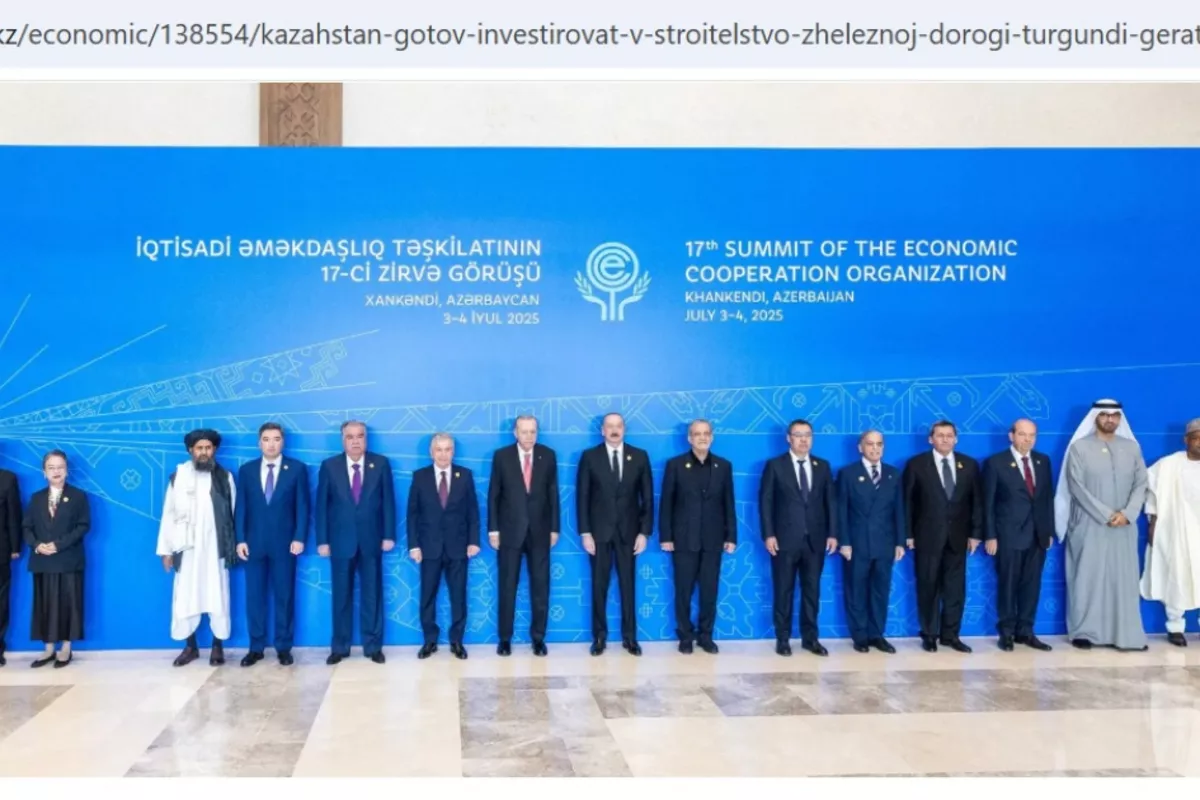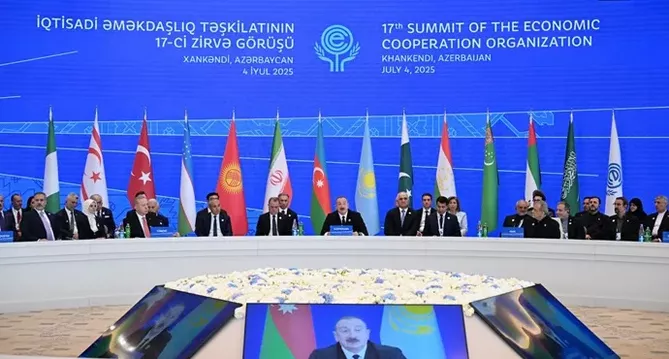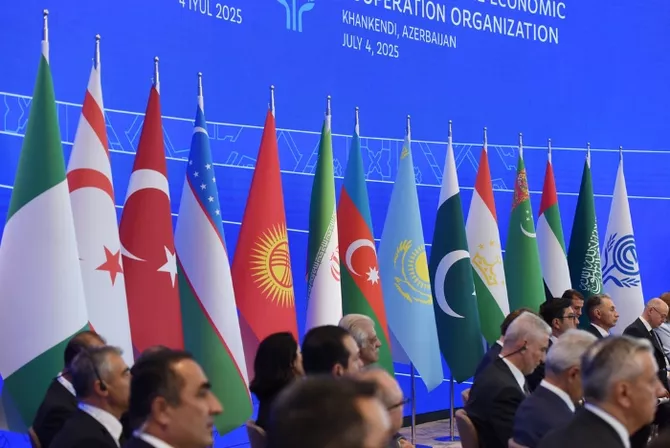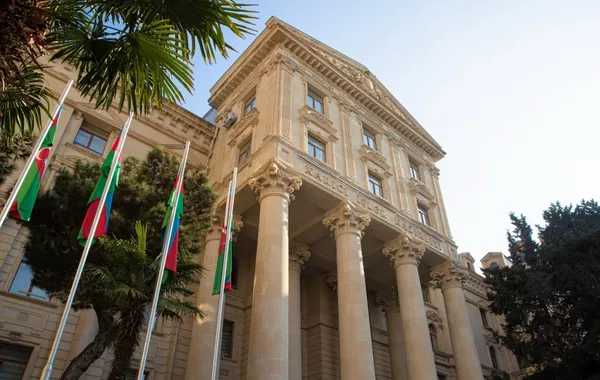
Photo: AZERTAC
In a recent article, EU Reporter highlights that Azerbaijan continues asserting its role as a regional leader by actively promoting sustainable development and enhanced connectivity through close cooperation within the Economic Cooperation Organization (ECO), The Caspian Post reprints the item.
Leveraging its strategic location, robust infrastructure, and commitment to regional integration, Azerbaijan is assisting to shape a more interconnected and resilient future for the ECO region-facilitating trade, energy transit, and green growth across Eurasia.
The Republic of Azerbaijan hosted the 17th Summit of the Economic Cooperation Organization (ECO) on 3-4 July in Khankendi, Karabakh region - a major milestone for the region that reaffirms the country’s growing leadership in promoting regional cooperation and sustainable development.
This historic Summit, the first major international event to be held in Khankendi after the restoration of Azerbaijan’s full sovereignty over Karabakh, brought together ECO heads of state and government, ministers, observers, special guests from non-ECO countries, and heads of international organizations to pursue the shared goal of development and prosperity through enhanced economic integration, writes Shahmar Hajiyev, Head of Department, Azerbaijan’s Center of Analysis of International Relations.
Leading up to the Summit, a dynamic and inclusive ECO Week held from July 1-4 across multiple cities in Azerbaijan. ECO Week included thematic forums that emphasize youth engagement, gender inclusion, and regional economic connectivity. Notably, the ECO Youth Forum, with the theme “Enhancing the Role of Youth for Building a Sustainable and Climate-Resilient Future,” took place in Aghdam on July 1. The ECO Women Forum, focusing on “Enhancing the Role of Women for Building a Sustainable and Climate-Resilient Future,” held in Lachin on July 2. On the same day, the 6th ECO Business Forum gathered investors and business leaders in Fuzuli under the theme “Investment and Trade Promotion as a Catalyst for Sustainable Development in the ECO Region.” In addition, Shusha city in Karabakh was elected the tourism capital of ECO region in 2026. All these events, were held in Karabakh region of Azerbaijan to create a powerful message reinforcing country’s sovereignty, national identity and narrative.
ECO has become an increasingly attractive platform for regional trade and cooperation, particularly for the landlocked countries of Central Asia and Azerbaijan. Azerbaijan has been an active member since joining the organization on 28 November 1992. Today, ECO includes Azerbaijan, Türkiye, Iran, Kazakhstan, Kyrgyzstan, Pakistan, Tajikistan, Turkmenistan, Afghanistan, and Uzbekistan. The ECO region is geographically vast and well-endowed with potential economic resources in different fields and sectors, such as agriculture and arable land, energy and mining, human resources, and a vast strategic trading region. The ECO region as a whole posted an annual average real GDP growth rate 3.8% over the last decade. The overall nominal GDP of the region stood at $2.4 trillion and real GDP grew at a clip of 3.7% at the end of 2023.

photo: IRIA
The 17th ECO Summit in Khankendi is especially significant in light of Karabakh’s reintegration and reconstruction. Karabakh region has become an arena for important diplomatic meetings and international forums after liberation. On July 3, ahead of Summit President Ilham Aliyev and Sadyr Zhaparov, President of the Kyrgyz Republic, participated in the inauguration ceremony of the first phase of the village of Khidirli in the Aghdam district. Throughout the years, ECO members have consistently supported Azerbaijan’s sovereignty and territorial integrity. They advocated for Armenia’s withdrawal from occupied Azerbaijani territories in line with UN Security Council Resolution 822, adopted on 30 April 1993. Furthermore, ECO members regularly support one another’s positions in international platforms. For instance, Azerbaijan’s election as a non-permanent member of the UN Security Council in 2011 was achieved with the strong backing of ECO countries.
Azerbaijan actively promotes regional projects within ECO, especially in energy and transportation. The country previously hosted the 9th ECO Summit in May 2006 and the 12th Summit in Baku in October 2012. Under Azerbaijan’s chairmanship, ECO designated 2023 as the “Year of Green Transition and Interconnectivity”-a theme aligned with the “ECO Vision 2025” and aimed at bolstering cooperation in priority sectors. Azerbaijan’s chairmanship focuses on two key areas: Green Transition and Interconnectivity. These themes reflect the need for coordinated efforts to maximize synergies among member states in energy, climate action, and transportation.
The country is deepening cooperation within the ECO. Azerbaijan’s trade turnover with ECO countries continues to grow. In 2024, this figure reached USD 7.95 billion, with the largest trade volume conducted with Türkiye (77.1%), followed by Iran (8.1%), Kazakhstan (5.9%), and Turkmenistan (4.8%). The rest included Uzbekistan, Kyrgyzstan, Pakistan, Tajikistan, and Afghanistan. Deepening cooperation within the ECO framework is strategically important, as several ECO members-including Kazakhstan, Kyrgyzstan, Uzbekistan, and Türkiye - also belong to the Organization of Turkic States (OTS), further linking shared regional interests.

photo: News Central Asia
Strengthening regional integration, supporting transit corridors, trade and energy export are Azerbaijan’s goal to become the region’s primary energy and transport hub. The country has successfully completed key energy infrastructure projects like the Baku-Tbilisi-Ceyhan (BTC) oil pipeline and the Southern Gas Corridor (SGC), enabling the export of Caspian energy to global energy markets. Delivering the opening speech during the 17th ECO Summit, President Ilham Aliyev touched upon Azerbaijan’s key role in maintaining energy security: “Today, Azerbaijan ensures the energy security of many countries and exports natural gas to 12 countries through various gas pipelines. We are among the global leaders in this regard.” With the shift toward sustainable energy, Azerbaijan is also prioritizing green energy development and export. An agreement has already been signed on the interconnection of energy systems between Azerbaijan, Kazakhstan, and Uzbekistan. Moreover, within the COP29, the Clean Energy Center for the ECO region (CECECO) was established in Azerbaijan together with ECO and the United Nations Industrial Development Organization (UNIDO), reinforcing its leadership in this emerging sector.
In transport sector, Azerbaijan plays a pivotal role in implementing regional corridors, including the International North-South Transport Corridor (INSTC) and the Middle Corridor or the Trans-Caspian International Transport Route (TITR). Projects like the Baku-Tbilisi-Kars (BTK) railway enhance direct access between Central Asia, the South Caucasus, and Europe, increasing Azerbaijan’s geopolitical and geoeconomic relevance. The BTK project helps reduce transportation costs and increases transit operations through the Middle Corridor. Improved infrastructure and increased cargo transit through these corridors will significantly boost trade within the ECO regions. All critical infrastructure projects have transferred the country into a key international transport and logistics hub.
In conclusion, Azerbaijan pursues a proactive and strategic foreign policy within the ECO frameworks. The country maintains deep historical and cultural ties with ECO member states and supports initiatives that promote intra-regional connectivity across trade, transport, energy and sustainability. To this end, the 17th ECO Summit is very significant to assess ongoing cooperation and deepen collaboration in trade corridors, sustainability and economic alignment in the year ahead. While opportunities for cooperation are substantial among ECO states, especially in energy, transport, tourism, and agriculture, challenges such as geopolitical tensions, infrastructure gaps, security concerns, and trade barriers must be also addressed. By supporting strategic sectors and deepening economic ties, Azerbaijan can continue to enhance its influence within the organization and solidify its role as a key driver of prosperity in the wider region.
Share on social media
